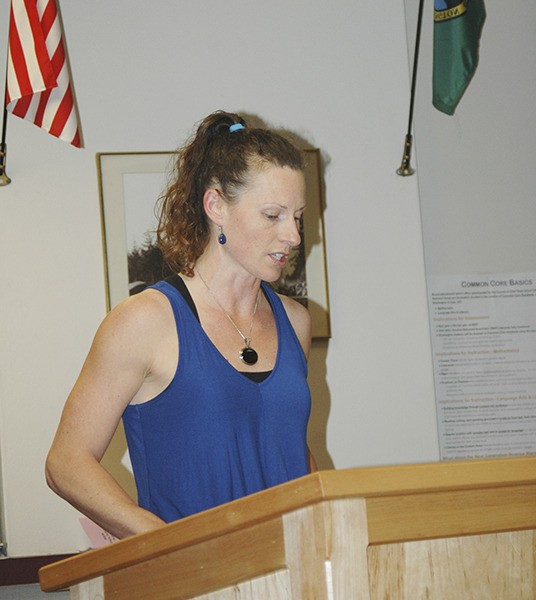In response to a daylong work-stoppage, Sequim schools have been canceled districtwide on Monday, May 18.
Consistent with Sequim School District Superintendent Kelly Shea’s recommendation, the Sequim School Board of Directors voted Tuesday, May 5, to cancel school the day of the Sequim Education Association’s organized work stoppage.
Despite no school that day, the board also voted to maintain extracurricular activities.
“It’s not a safe situation for students to be here without teachers,” John Bridge, board member, said after making the motion to cancel school during the work stoppage.
With about 20 substitute teachers that serve the Olympic Peninsula, Gary Neal, Sequim School District assistant superintendent, noted there aren’t enough qualified people to replace the absent teachers.
Although Sequim teachers may be absent from their classrooms, Linsay Rapelje, Sequim High School teacher-librarian and SEA acting president, told the board of directors, they’re “not taking the day off.”
“We will be working to bring publicity and attention to the crisis in education funding,” Rapelje said.
However, to recover the teachers’ lost day with students, the board of directors agreed in a 3-2 vote to add Thursday, June 18, to the academic school year.
Graduating seniors won’t have to attend the make-up day because they’re legally allowed five days fewer than the normal 180 days of contact time, Brian Berg, chief negotiator for Sequim Education Association, teacher and secondary math professional development coordinator, said.
Expressing frustration
Instead of being in their classrooms during the districtwide, one-day and unpaid work stoppage, teachers are planning to demonstrate their “frustration with the Legislature,” Rapelje said.
Demonstrations may include, “informational picketing in prominent locations, a rally in support of public education, sending a group to Olympia when legislators are present and possible joint activities with other associations on the Olympic Peninsula,” she told the board of directors.
“The point is to get the Legislature to fully fund education and make it better,” she said. “The work stoppage is ultimately about the students. If the Legislature would follow through with McCleary, it would be a positive step for education.”
An intentional effort to better education is at the core of the teachers’ union decision, she explained further. The work stoppage targets the Legislature’s inaction to uphold the Supreme Court’s order following the McCleary decision in 2012.
In the McCleary case, the Supreme Court ruled the state isn’t meeting its “paramount duty” regarding basic education, according to the Washington Office of Superintendent of Public Instruction.
To remedy this, the court endorsed a plan for the state to fully fund transportation, maintenance and supplies, lower class sizes for grades K-3, fully fund educational staffs’ salaries and provide state funding for enhanced levels of educational staff by 2018.
Deciding on a work stoppage
Members of the teachers’ union first voted April 27 to pursue a work stoppage. Leading up to that decision and since, SEA members have been in close communication with the school administration.
“Our teachers have been very cognizant to the impact (of a work stoppage) on the district and the students,” said Shea. For example, in planning the proposed work stoppage, members of the teachers’ union are being mindful of testing days and sports, he said.
“We understand that our action will be inconvenient for many families, but we feel the inaction of our Legislature has created a far greater inconvenience and injustice to our community,” Rapelje told the board.
Although the board concluded after-school activities, like sports practices, will continue despite the cancellation of school, both board members Heather Jeffers and Michael Howe opposed the motion.
“I think it sends the message that sporting events are more important than academics,” Jeffers, board vice president, said.
Howe, the board’s legislative representative, not only opposed the motion to maintain extracurricular activities during the work stoppage, but questions the legality of the entire work stoppage.
“I encourage them not to do (the) walkout and instead pursue alternative ways to communicate to the Legislature,” Howe said.
Regardless of lingering concerns, Rapelje told the board that in doing a one-day work stoppage the SEA members are joining “thousands of other teachers in more than 20 different districts.”
“We did not make this decision lightly,” Rapelje said.
Although some SEA members expressed concern about the impacts of a work stoppage on the ability to pass a bond, Rapelje told the board the union ultimately “decided to move forward because as much as students in Sequim deserve safe and adequate facilities, they deserve the full financial support of the state as well.”
Having a confirmed date for the work stoppage, Shea said, in preparation for Monday, May 18, district officials will inform the public via a variety of methods, such as e-mail, phone calls, the district website, social media outlets and traditional news mediums.
Traditionally the last day of the Sequim school year is a half-day. With the work stoppage, June 17 is now a full day with that half-day moved to June 18.
B&G Club to open during work stoppage
Sequim Boys & Girls Club, 400 W. Fir St., plans to open for free 8 a.m.-6 p.m. Monday, May 18, during the planned walk-out for Sequim School District’s students ages 6-18. The club will offer breakfast, lunch and an afternoon snack.
“We want to support the families and children of our district,” said Mary Budke, executive director of the Boys & Girls Clubs of the Olympic Peninsula.



